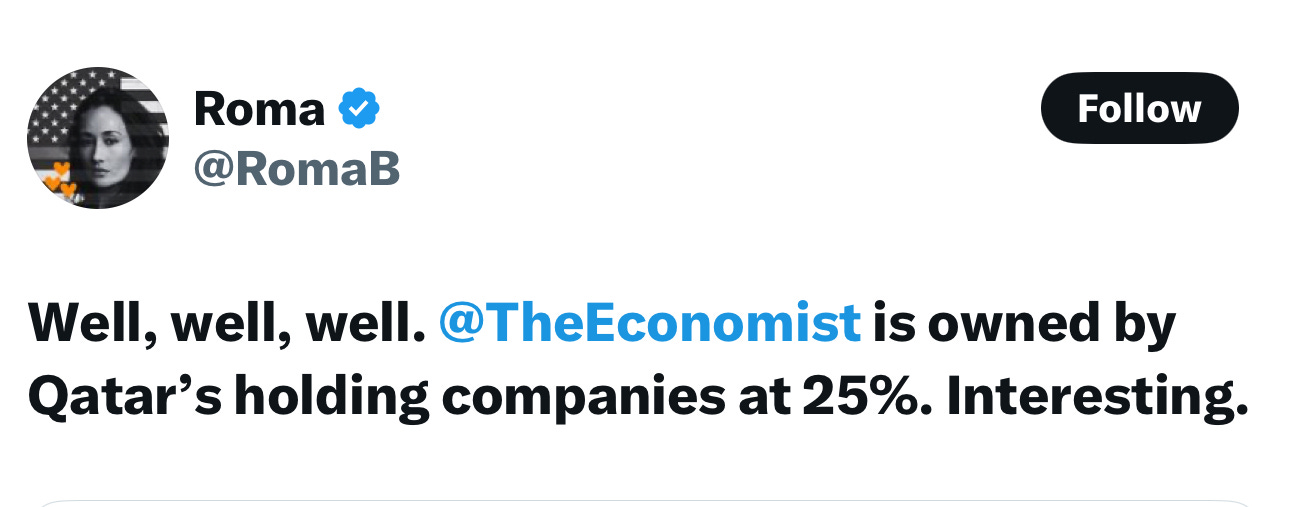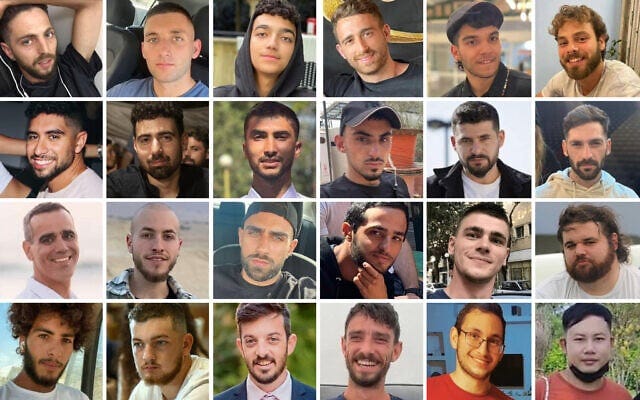The (fake) Economist Betrayal
No Qatar Doesn’t Influence Editorial Decisions at The Economist
NOTE TO READERS: The links to The Economist pieces are gift links, meaning you can read the articles for free without a subscription. I revived my subscription to The Economist specifically to write this piece. Please subscribe if you haven’t already. I don’t use paywalls very often however I don’t receive any funding from any sources, I operate Adventures of Bad Hijabi as a one-woman show, independent of any influencers, so I welcome paid subscriptions to support the work I do here.
Paid subscriptions support independent media, a thing desperately needed in Canada right now. Democracy cannot survive without responsible and accurate reporting.
I rely on social media content from We Are All Hostages and UnXeptible for accurate information about Israeli politics, including the hostage the status of ceasefire hostage deals. Please support the victims of the October 7th massacre by following and supporting these organizations. Remember you can support democracy by choosing accurate information over propaganda, by doing your due diligence when you consume information online. Consider that all news sources have their bias, and conduct yourself accordingly.
Read on for today’s piece, in which I address the baseless accusations of the Hasbara conspiracy theorists regarding Qatar controlling editorial decision making and content of The Economist.
Well, that’s patently false. It’s silly. It’s irresponsible. It’s purely propaganda. No effort made to do due diligence. It’s easy to verify the connection between the Qatari Investment Authority (QIA), Exor, (the investment arm of the Agnelli family), and The Economist Group.
Here’s the reality of the financial connection between QIA and Exor, a major shareholder of The Economist Group, which controls The Economist publication. I’ve verified this information from multiple open source data. The Economist has as a unique system of ownership to guard the independent editorial process that’s made The Economist famous. I’ve studied the ownership structure of The Economist Group, which I’ll describe in detail a bit later, below.
Without 2025 shareholder filings from Exor (typically released annually), the 5-10% range is an educated guess. Exor’s 2023 annual report listed Giovanni Agnelli B.V. at 52.57% and other institutional investors, but QIA’s exact stake often falls below disclosure thresholds (e.g., 5% in the Netherlands) unless voluntarily reported. Let’s assume 7% as a midpoint for calculation purposes—higher than a token stake but below a controlling interest. — Grok
I can’t believe I’m writing this article, it’s ridiculous.
The Economist dared to publish a piece of critical journalism about the Netanyahu-led Israeli regime, (see the right hand side cover above, titled Israel’s Hubris), and several conspiratorial Hasbara muppets on Xwitter got excited and decided the evil Qatari boogeyman made the Economist do it.
There are four articles about Israel’s Hubris, I’ll provide excerpts from each, along with an explanation and supporting media.
In January Itamar Ben-Gvir, the head of the hard-right Jewish Power party, left the coalition to protest against the Gaza ceasefire. He rejoined the government after Israel restarted the war. That gave Mr Netanyahu the numbers to pass this year’s budget, on March 25th. If he had not done so by the end of March, early elections would have been triggered. Breaking the ceasefire thus helped clear the way for the prime minister to remain in power until late 2026. — An Unrestrained Israel is Reshaping the Middle East, The Economist, 26.3.2025
Video Caption: Lishay Lavi Miren tries to talk to Orit Strook before the vote on the budget: Human life is more important than anything. “You can keep nodding but I see that nothing is getting through and you're not really listening. Oh, and woe if he doesn't come back alive.”
🎥: Lishay Lavi via Noa Shpigel on X
Netanyahu’s far right coalition partners have repeatedly expressed a willingness to sacrifice the hostages to achieve their military ends. Ben Gvir quit the coalition after the ceasefire agreement, Netanyahu needed his far right supporters to pass the budget, or he would face the fall of his government, the ensuing elections, and his corruption charges. The Hasbara cult repeats the misrepresentation that Hamas violated the ceasefire, preventing phase two from happening. In reality, the Netanyahu regime never wanted to proceed with phase two, and so did not. The goals of war and staying in power take priority over saving hostage and IDF lives, and over generally stopping the bloodshed. Far right members of the diaspora decry the betrayal of left wing Israelis, whom they view as traitors, I am unable to forgive the left, goes the self indulgent refrain of Netanyahuists.
Overextension may be most corrosive within Israel. The trauma of October 7th ought to have united Israeli society. However, the country is once again divided. A clear majority of Israelis support negotiations with Hamas and a withdrawal from Gaza in order to bring the remaining hostages there home. They believe that the prime minister, Binyamin Netanyahu, is prosecuting the war to appease the hard right, whose support he needs to prevent his government from collapsing. Increasingly, army reservists wonder if they are fighting a war in the national interest or in the interest of a minority that happens to wield influence. — Israel’s expansionism is a danger to others—and itself: it risks turning hubris into disaster, The Economist, 26.3.2025
Video Caption: Tomer Haim, Former Head of the Mossad's Intelligence Division: “Netanyahu is a threat to Israel’s national security. I’ll say it again—Netanyahu is a threat to Israel’s national security.” Not just for the failure of October 7. But for letting Iran get closer than ever to a nuclear bomb. If Iran becomes nuclear, Netanyahu will bear the responsibility. This isn't politics. This is the cold, hard truth, from someone who's spent 30 years protecting Israel.
🎥Credit: UnXeptible
Protests have erupted in Israel, as the Israeli people grow restless and impatient with Netanyahu’s War. War costs and a nation can sustain the costs of war only for a limited time. Parents and spouses and children sent their loved ones off to war thriving and alive and receive them back in body bags, as reservists are called up for service, and an intense debate rages about Haredi conscription—generally the nation questions of the ethics of this war. The people of Israel remain deeply divided and troubled about their collective security and what lies ahead in their country’s political future. Any military aggression against Gaza becomes a death sentence for the hostages.
A renewed clash between Israel’s government and judiciary seems all but inevitable. By law the Shin Bet’s mandate includes protecting “Israel’s democratic process and institutions”. It may soon understand that to mean protecting Israel’s democracy from its prime minister. — Israel’s strikes may be only the start of a new offensive in Gaza: Politics mean Binyamin Netanyahu wants to keep open the possibility of a return to full-scale war, The Economist, 26.3.2025
Video Caption: "They ask me how we got to this point?" This is how Danny Elgart opened his speech tonight – and called on us all to wake up. "It all started with the assassination of Rabin – and continued with the assassination of democracy." Netanyahu fled from responsibility, from the investigations, from the hostages – and from the truth. Protest is the only way to stop the sacrifice. 📸 Credit: Roy Bushi via UnXeptible
Protesters supporting hostages and their families started gathering outside the Knesset this week, blocking access to the parliament building in a bid to draw attention to the plight of the hostages. Security forces used water cannons to subdue the crowd and forcibly removed protesters. Danny Elgart’s brother Yitzhak was taken hostage and believed to be alive, was listed amongst 33 hostages to be returned, and then Elgart received word from Israeli security officials about “grave concern for his Yitzhak’s life”. Elgart received his brother’s body in February—he blames Netanyahu’s refusal of at least two Hamas offers, and the reckless bid to capture the Philadelphi Corridor, for Yitzhak’s death. Netanyahu has never apologised to the hostage survivors or families, and has never taken responsibility for the worst atrocities to afflict the Jewish people since WW2. Hostages families and survivors of 7.10 feel Netanyahu has failed them.
More recently, spurred by the example of Donald Trump replacing America’s security and defence leadership with loyalists, he has gone on the warpath himself. But he lacks the American president’s powers to hire and fire. Israel’s top jobs are reviewed by civil-service committees and can be petitioned against in the Supreme Court.
Moreover, the members of an Israeli national commission of inquiry must be chosen by the president of the Supreme Court. Rather than submit to scrutiny and account for his long-held strategy to “contain” Hamas in Gaza, Mr Netanyahu has steadfastly tried to pin the blame for October 7th entirely on the Israel Defence Forces (idf) and Shin Bet, the domestic security service. Since the attack, the military and security chiefs have clashed with him over the lack of a strategic “day-after” plan for Gaza and for his failure to prioritise a deal with Hamas to free the Israeli hostages, a plan Mr Netanyahu’s far-right coalition partners have opposed. — Binyamin Netanyahu likens himself to Donald Trump: Israel’s prime minister is again under pressure from lawyers and security men, The Economist, 12.3.2025
Prior to the October 7th massacre, Netanyahu fractured the country over his proposed judicial reforms. Netanyahu has dodged corruption allegations and calls for investigations regarding failures that led to 7.10, including connections with Qatar and support of Hamas to thwart the Palestinian Authority. Bibi has declared his intention to fire the Attorney General—Gali Baharav-Miara holds the Netanyahu government in contempt for seeking to operate above the law. Always seek to throw others under the bus to redirect responsibility away from himself, Netanyahu has fired head of Shin Bet, Ronen Bar. Shin Bet opened an investigation into the allegations that Netanyahu’s top aides had ties to Qatar, which backs Hamas. Netanyahu’s Machiavellian leadership has kept the country at the edge of a constitutional crisis.
I urge you to read the four Economist pieces to which I have gift-linked. I have supplemented with footage and images from the front lines of hostage families and anti-government protest. Reader, these seem like reasonable and balanced pieces on Israel which The Economist has published. There’s nothing in any of the pieces in Israel’s Hubris which meets the standard of antisemitic attacks on Israel. These reality based articles about the political landscape in Israel exemplify honest journalism about the critical issues facing the Netanyahu regime and the impact on the Israeli people.
So, reader, it would seem the Hasbara cult got comedically excited in response to a reasonable feature about Netanyahu-led Israeli regime. I made a rundown of the most entertaining accusations I caught on Xwitter Friday morning. They’re so histrionic and funny I made them into a song called The Economist Betrayal, which I created with the help of Mureka AI, based on the lyrics (below) which I fed to it. The genre is Disco, specifically Percussion Electronic, Quirky Majestic Calm.
(Shout out to Paul Wells for the tip about Mureka)
The Economist Betrayal: People are surprised The Economist hates Israel? Qataris fund the Economist. Whatever Qatar touches turns pretty evil. Their money has strings attached. The Economist sold out. As always, follow the money. And to you Qatar, your reign must come down.
The histrionics about The Economist Betrayal have no basis in reality — they’re unfounded, as in conspiratorial. To show you how, we’re going to look at ownership structure and also shareholder breakdown.
Let’s first turn to the ownership structure of The Economist Group.
The share capital of The Economist Newspaper Limited, The Economist Group's parent company, is divided into ordinary shares, "A" special shares, "B" special shares and trust shares. The company is private and none of the shares are listed. Its Articles of Association also state that no individual or company can own or control more than 50% of its total share capital, and that no single shareholder may exercise more than 20% of voting rights exercised at a General Meeting of the company. — the Economist Group website
The trustee group exists independently of the board directors and the shareholders. The trustees safeguard the honesty, integrity and independence of its journalism, enabling the paper to remain free from the commercial pressures of the rest of the Group. The board of directors oversees the general long term operation of the Group. This eliminates the possibility of shareholder influence on editorial decision making and content.
Now, let’s look at the shareholder situation of The Economist Group.
In 2015, Exor increased its stake in The Economist Group to 43.4% by purchasing shares from the Pearson group, which held a 50% stake. The remaining shares are held by other shareholders, including families like the Rothschilds (with approximately 21%) and other smaller stakeholders such as the Cadbury, Schroder, and Layton families, as well as some staff and former staff. In 2021 a company called Covéa welcomed the QIA into shareholder base. In 2022 Covéa acquired a company called PartnerRe from Exor, which has shares in The Economist Group.
That’s it. That’s all. Honestly.
In the world of hardware, wing-nuts can be easily tightened and loosened without much exertion or effort. Humans become conspiracy theory wing-nuts as a means to indulge their need for subjective control, for certainty in an uncertain environment, and to maintain membership in the group. There’s no Qatari influence on editorial decision making of The Economist. There’s no global conspiracy to target Israel in a malicious Machiavellian manner. It’s simply untrue, no facts support these claims.
The Economist wrote and published an issue entitled Israel’s Hubris because it has a duty to report on important issues affecting the world, and the extremism of the Netanyahu regime warrants critical attention from journalists and media. There’s no insidious Jew hatred couched in these reasonable features about Israeli politics. Hate has become a shield people use to deflect the uncomfortable truth about their identity group, it’s a common invocation of the far right pro Israel group — typically radicals and extremists adopt a grievance mindset, it justifies unreasonable responses to reasonable circumstances and behaviour.







